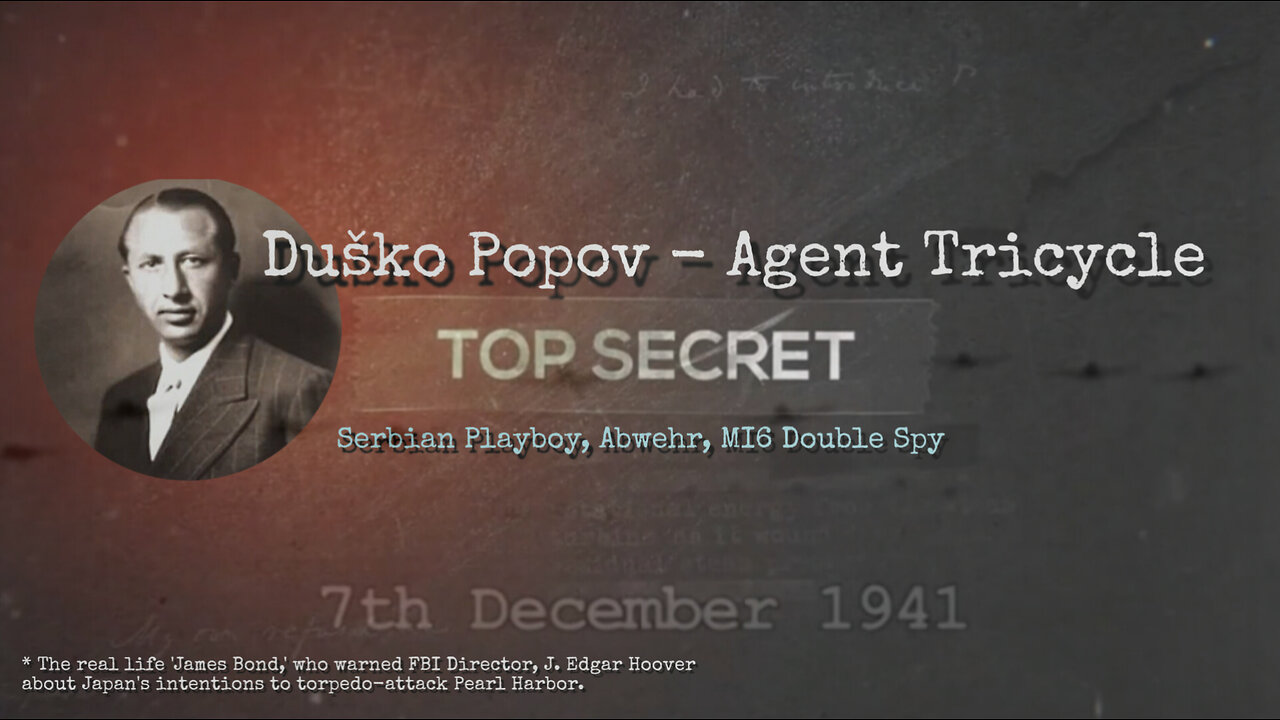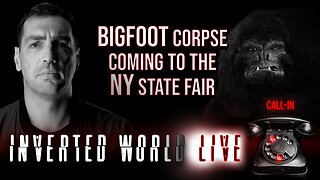Premium Only Content

Duško Popov: Serbian MI6 Double Agent, warned FBI re: Pearl Harbor Torpedo Attack 08/11/41
Duško (Dušan) Popov OBE (Serbian Cyrillic: Душко Попов; 10 July 1912 – 10 August 1981) was a Serbian double agent who served as part of the MI6 and Abwehr during World War II. He passed off disinformation to Germany as part of the Double-Cross System while working as an agent for the Yugoslav government-in-exile in London.
His name was Dusko (or Dusan) Popov; a flamboyant son of a wealthy and well-connected Serbian family. Code named Ivan, he was one of the Abwehr’s top agents. On Aug. 10, 1941, the German intelligence organization sent him to the United States to establish a German spy network. What the Abwehr didn’t know was that Popov, code name Tricycle, was a double agent working for the British Secret Intelligence Service’s XX (Double Cross) organization, and that all of Popov’s information to the Abwehr had been supplied by the SIS.
Popov carried a long list of intelligence targets the Germans wished to receive information about, some three pages of them. One entire page, however, was devoted to detailed questions about American defenses in and around Pearl Harbor. Such a detailed request for information strongly suggested Japanese plans for an attack on the American military bases in and around Pearl Harbor. SIS’s plan called for Popov to hand over to the FBI that intelligence and assist it in creating a “hostile” spy network. There was just one problem: FBI Director J. Edgar Hoover.
Upon his arrival in New York City, Popov discovered that instead of immediately meeting Hoover, he’d have to wait for an appointment. Well, if he had to wait, he’d do so in style, with a Park Avenue apartment and one beautiful, rich, and famous woman after another. To Popov’s surprise, this activity caused the FBI to threaten him with arrest and deportation.
Popov’s eventual meeting with Hoover was a disaster. As described by Hervie Haufler in his book The Spies Who Never Were, the FBI director began by shouting, “You come here from nowhere and within six weeks install yourself in a Park Avenue penthouse, chase film stars, break a serious law [the Mann Act], and try to corrupt my officers. I’m telling you right now I won’t stand for it.”
Stunned, Popov replied, “I brought a serious warning indicating exactly where, when, how and by whom your country is going to be attacked.” In addition to providing details about the Pearl Harbor raid, he tried to convince Hoover of the value of an enemy spy ring under FBI control. But Hoover’s prejudice against Popov was manifest. The Pearl Harbor attack warning was not forwarded to the military and the spy ring offer was rejected.
Popov did eke out some minor FBI assistance that justified his trip to the Germans, but Popov bitterly confessed to Col. Dick Ellis, his British contact in New York City, that thanks to Hoover’s prejudice and shortsightedness, the mission was a failure.
Popov was credited with being one of the inspirations for Fleming’s spy, James Bond, and the casino scene in its various permutations would become arguably the most famous scene in the Bond novels and movies.
Though Popov’s playboy lifestyle offended Hoover, it had the opposite effect on naval intelligence agent Ian Fleming. Prior to the mission, Popov, then based in Lisbon, received eighty thousand dollars in cash for expenses. Before he left, Popov decided to relax at a local casino. At one point there he spotted at a baccarat table an acquaintance, an arrogant, wealthy Lithuanian. In his autobiography Spy/Counterspy, Popov wrote, “When holding the bank [the Lithuanian] would never set a limit, as was customary. Instead, he’d announce haughtily, ‘Banque ouverte,’ meaning the others could bet as much as they wished. It was ostentatious and annoying. . . .”
When the Lithuanian again said, “Banque ouverte,” Popov decided to put a stop to the nonsense. The croupier called for bets that the Lithuanian as banker was obligated to match. Popov calmly announced, “Fifty thousand dollars” – about $1.4 million in today’s money. All conversation stopped as Popov counted out the bills. Popov, who knew Fleming was secretly shadowing him because of the cash, slyly noticed Fleming’s face turn chartreuse.
Pointing to the now silent Lithuanian, Popov said, “I suppose that the casino is backing this man’s bet, since you didn’t object to his ‘Banque ouverte.’”
“The casino never backs any player’s stake, sir,” the croupier replied.
Popov then collected his money and said, “I trust you’ll call this to the attention of the management and that in the future such irresponsible play will be prohibited. It is a disgrace and an annoyance to the serious players.”
As Popov walked away, he saw Fleming smile with amused comprehension. Popov was credited with being one of the inspirations for Fleming’s spy, James Bond, and the casino scene in its various permutations would become arguably the most famous scene in the Bond novels and movies.
After the war, Popov forged a successful business career, married, and had three sons. He died peacefully in his home in the south of France in 1981 at age 69.
• https://www.defensemedianetwork.com/stories/dusko-popov-real-life-james-bond-ran-afoul-of-the-fbi/
-
 2:35:23
2:35:23
FreshandFit
7 hours agoWhy Black Men Don't Date Black Women Debate
32.5K33 -
 2:03:42
2:03:42
Inverted World Live
11 hours agoBigfoot Corpse Coming to the NY State Fair | Ep. 94
104K24 -
 6:16:23
6:16:23
SpartakusLIVE
12 hours ago$1,000 Pistol Challenge || #1 ENTERTAINER of The EONS Eradicates BOREDOM
80.3K2 -
 2:33:37
2:33:37
TimcastIRL
9 hours agoTrump Orders Review of Smithsonian For Being Woke & Out of Control | Timcast IRL
182K74 -
 3:09:10
3:09:10
Barry Cunningham
12 hours agoPRESIDENT TRUMP HAS TAKEN THE MONSTER AWAY FROM THE LEFT! HORROR STORIES WON'T WORK ANYMORE!
81.6K80 -
 1:29:55
1:29:55
WickedVirtue
7 hours agoLate Night Fortnite w/ Friends
50.9K -
 3:34:06
3:34:06
This is the Ray Gaming
7 hours ago $1.07 earnedCould you be? Would you be? Won't you be my RAYBOR? | Rumble Premium Creator
30.9K -
 1:46:52
1:46:52
JahBlessGames
8 hours ago🎉Come een' and come tru' - VIBES | MUSIC | GAMES
52.3K2 -
 38:47
38:47
MattMorseTV
10 hours ago $14.49 earned🔴Tulsi just CLEANED HOUSE.🔴
68.2K127 -
 6:24:06
6:24:06
Reolock
11 hours agoWoW Classic Hardcore | WE'RE BACK!!
30.8K1